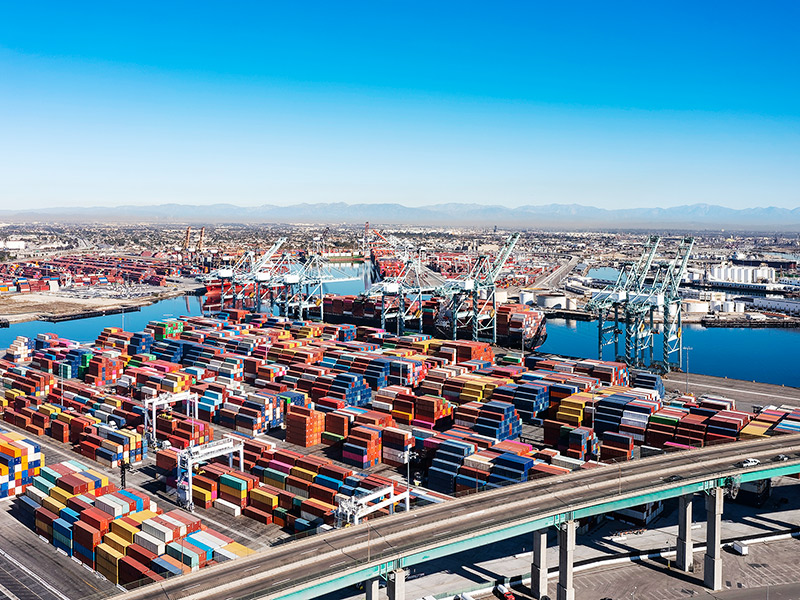
"The White House" by Kathleen Tyler Conklin is licensed under CC BY 2.0
Now that the results of the United States presidential election are in, it is time to focus on what business can do to promote a policy agenda that will accelerate the transformation needed to shift to a truly just and sustainable economy.
The U.S. government has been either absent or counterproductive on sustainability issues over the past four years. This will change in a Biden-Harris administration. How much it changes will depend greatly on the actions and influence of the business community.
BSR exists to catalyze business leadership to achieve a just and sustainable world. We believe strongly that sustainability is a primary source of strategic business advantage. We believe that comprehensive business action calls for companies to “act, enable, and influence,” creating change both through actions in the “real economy” and also in advocating for policy solutions. With a new government coming into power, now is the time for business to use its voice and influence to call for decisive action from a more receptive administration in Washington.
With this in mind, here is the agenda that BSR urges businesses to call on the Biden administration to adopt, in the spirit of the campaign’s “build back better” mantra.
Employment and Economic
- Repairing the safety net: It is time for business to engage with government in remaking the social safety net for the 21st century. 2020 has exposed the serious holes in the safety net, not least access to health care. It is also time to develop a consensus on portable benefits for people who change jobs or who work outside traditional jobs. Innovations like the tax-deferred “401(j)” accounts proposed by Al Gore to allow employees to save for lifelong learning would also be a good step. These steps would not only enable economic security and mobility, they would also ensure opportunities for innovation and a dynamic workforce that businesses need.
- Income inequality: It is long past time for Americans to reverse the deep and widening inequality that plagues our country. While there are multiple reasons for this problem, three topics deserve to be made a priority. First is the need to raise the minimum wage to a level that is a genuine living wage. This would both enable families to support themselves and also reward labor in an economy in which capital has been rewarded more than it should be. Second is executive compensation, which has continued to rise far too fast. It is time for business leaders to take voluntary steps to reduce executive pay and for Boards to commit to the same. Third, income inequality strikes communities of color especially hard and all pathways to prosperity need to address the wealth gap directly.
- Future of work: The changing nature of work is accelerating due to the confluence of COVID-19 and automation. Contingent or non-traditional work is the fastest growing category of work. There is no consensus on the rules governing such work or universal benefits people can access regardless of how their work is classified. Dialogue between business, government, and workers’ representatives is needed to establish the rules of the road.
Climate and Environment
- Net zero target for the U.S.: Returning to the Paris Agreement will happen January 20—that is only the start. The U.S. should commit to a net zero target the way that the European Union, China, Japan, South Korea and others – including many U.S. states and cities – have. The need for renewed climate diplomacy, with the U.S. playing a crucial role along with the EU, China and Japan, could not be more important in the run-up to COP 26.
- Climate justice/just transition: Awareness of the disparate impacts of climate – mainly hitting communities of color and those with less formal education – means that environmental justice should now come to the forefront. The shift to net zero is a generational opportunity for progress, not only removing the most toxic elements of the existing energy system, but generating economic opportunities in the clean energy economy as a means of combatting poverty and discrimination. Business should insist that the transition to net zero include policies that prioritize the phase out of toxic impacts on communities of color, incentives for investments that ensure that the clean energy economy delivers training, and employment for people who need opportunities the most, in both rural and urban communities.
- Green infrastructure: Even with divided government, investment in green infrastructure is possible as a means of generating employment at a time when it is badly needed and to reduce the operating costs of U.S. infrastructure. Business should advocate for built environment and transport systems that accelerate and prepare for the net zero economy. The long debated Green Infrastructure Bank should become a reality, not least with the rise of green and “olive” bonds. And this is also the place where serious—and badly needed—resilience objectives can be achieved.
- Regenerative agriculture: At long last, there is mainstream recognition of the deep intersections of climate, human health, and the vibrancy of America’s agricultural economy. What’s more, the political opportunity to bring the country together through heartland interest in thriving agriculture and coastal interest in climate action is one that could help unify a country that is divided against itself on climate action.
Social
- Racial justice: The Biden campaign made clear that racial justice was one of its four priorities, along with climate action, economic opportunity, and public health. In fact, these four topics are interrelated and should be addressed as such. The business community should make sure that the many statements of support for Black Lives Matter in 2020 are strengthened by a long-term commitment to ensure that decisive action is taken to end the centuries-long scourge of systemic racism. As noted above, the wealth gap that exists in communities of color is a legacy of longstanding oppression. Steps taken to address climate, strengthen the social safety net, restore public health, and invest in green infrastructure offer great promise in addressing the wealth gap, and business should support this objective vocally. In addition, business should also make clear its support for criminal legal system reform, starting with policing, but also including access to the court system and incarceration rates. Finally, business should call for mandatory disclosure of employee demographic information, which leverages transparency in support of greater equity.
- Technology and human rights/privacy: It is well understood that policy moves more slowly than technology. At a high level, the U.S. government should establish the principle that new technologies should adhere to international human rights standards in their design, development, and use. In addition, the U.S. government can introduce a federal privacy law along similar lines to the GDPR, ensure that any revisions to Section 230 of the Telecommunications Decency Act of 1996 are consistent with the protection of human rights, and introduce sector-based approaches to regulating disruptive technologies, such as artificial intelligence, machine learning, and biometric technologies. Companies from all industries should advocate for a technology policy and regulatory context that protects interdependent rights such as freedom of expression, privacy, security, freedom of assembly, non-discrimination, public health, and access to remedy.
- Restoring support for human rights and democracy: The U.S. government has provided implicit and explicit support for some of the governments most responsible for the worst human rights abuses over the past few years, The business community shied away from calling this out the way they challenged the Trump administration’s approach to climate. It is time for business to make clear that it wants and needs strong support for human rights, with renewed action from the White House and State Department at a minimum
- Human migration and refugee policies: The xenophobia that was unleashed in the first days of the Trump years must be relegated to the past. Business has consistently called for immigration policies that enable the U.S. to welcome the breadth of human capacity that comes from literally every corner of the world. This is needed both for humanitarian reasons, which speak for themselves, but also because of the positive impact open societies have on economic vitality and innovation. What’s more, this will also help to restore America’s soft power around the world, something that benefits U.S. businesses and which has been seriously damaged since 2016.
Governance
- Corporate governance reforms and listing requirements: It is time for Boards to reflect more fully the world in which business actually operates. This means diversifying Board composition. It also requires that so-called “non-financial” considerations be embedded in corporate governance and listing requirements. A good first step towards integration of ESG into corporate governance would be business advocacy for making the recommendations of the Task Force on Climate-Related Financial Disclosures (TCFD) mandatory. This can then be extended to other steps including mandatory human rights diligence, executive compensation, and workplace diversity. All these steps will strengthen the resilience of business and bring America’s trading rules in sync with advances in Europe and elsewhere.
- Restoring democracy: 2020 has made clear, yet again, that there are significant structural flaws in American democracy. Business associations stepped up to call publicly for democratic processes to be honored—and have continued to call for this post-election. This remains important as many have chosen not to honor the clear outcome of the election. Despite this, American democracy appears poised to survive in the wake of this unusual election, but issues remain. Business should use its voice to call for reforms that address voter suppression, campaign finance, gerrymandering, and a judicial system that has been infected by hyper-partisanship. This is an issue that many CEOs will seek to avoid for fear of appearing to pick sides, and that is understandable. But the reforms called for here should not be seen that way, since they are necessary for our system to function, for all people to have their voices heard, and for faith in the system be restored.
- Rules-based trading system with multilateral agreements: The U.S. was the primary architect of the rules-based trading system in the wake of WWII and the primary protector of that system over the past 75 years. While this system certainly needs significant reforms, the past four years have taken a scorched earth approach that leaves us no hope of managing an interdependent world well and fairly. Business could not have more of a stake in restoring support for the concept of multilateralism and more of a need to make sure it is fit for purpose in the 21st century.
- Procurement: Finally, business should call on government to partner more aggressively on procurement policies. The U.S. government has immense purchasing power and it is not being used as fully as it could be to promote the creation and efficiency of markets for sustainable products and services. This is also a uniquely valuable way to address the wealth gap, with government partnering with BIPOC-owned businesses as suppliers.
There will be a time to get more specific on policy solutions. For now, however, it is essential to define the areas where progress is necessary. Much of what is advocated here is also found in BSR’s call for business action to promote a 21st century social contract.
The temptation to “go back to business as usual” will be strong for many, but that would be a mistake. Building a just and sustainable world has never been about opposing any single political leader. It has always been about building a future in which we can all thrive. It is about what we are for, not what we are against.
After four years when the U.S. government failed to embrace—and often thwarted—the achievement of sustainable business, the business voice remains a powerful tool in creating an economy that works for all.
Topics
Let’s talk about how BSR can help you to transform your business and achieve your sustainability goals.








